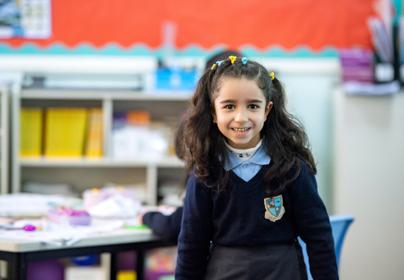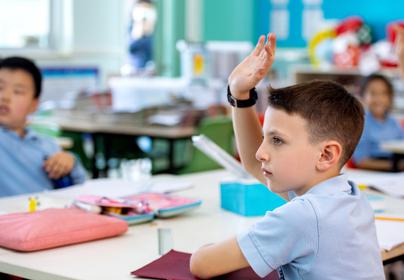Please briefly describe your journey to become a teacher at Britannica.
My journey to Britannica is one of the more unusual ones! I am originally from London, UK where I went to The Latymer School before going to the University of Southampton to study Economics. I subsequently trained to be a Chartered Accountant before realising my passion lay elsewhere. I took the leap to work internationally, teaching English in Busan, South Korea before returning to complete my Primary PGCE at the Institute of Education in London, specialising in Early Years. I then went on to work in both the public sector and the independent sector for 4 years before moving to Britannica and Shanghai.
Why did you decide to specialise in Early Years?
Originally I didn’t! When I first decided that I wanted to be a teacher I worked for 6 months as a Teacher Assistant to gain experience in a mainstream school. I originally requested to work in the higher end of the school, however there was no space, and I found myself in Reception. From then I never looked back! I absolutely loved it and really found my passion for teaching. Early Years is a fantastic phase to work in. The children have such a passion for learning and make such significant progress in such a short space of time. The license for creativity is huge and almost everything can be turned into a game! It’s so important to instill that love of learning in a child in their early years of school and it’s a privilege to play such a significant role in doing so.
How would you describe the EYFS at Britannica?
I will never forget what my teaching mentor said to me regarding what makes a good Early Years. She said, “You will open the door and want to go in and play yourself!” This is exactly the feeling I get walking round the Early Years department at Britannica. Learning through play is essential for children to engage with the early year’s curriculum, and the teachers here are great at creating multi-sensory, imaginative activities for the children to learn and engage with. All the staff here have strong early years backgrounds and this is evident in the hundreds of positive interactions they have with the children to scaffold and progress their learning each day.

Why is self-led learning so important in Early Years?
Children learn new information through memory and doing. Providing opportunities for children to lead and demonstrate their learning means children can learn to solve and develop lots of different problems and skills, from essential life skills like dressing and undressing themselves to more specific physical skills like cutting round straight and curved lines. By encouraging children to explore you are entrusting children to take risks and develop confidence. This does not mean that the role of the adult is redundant, far from it! The use of questioning and guidance can be decisive in both language development and scaffolding a child’s learning.
How would you describe a typical day in an Early Years Classroom?
I don’t think there is a typical day in an Early Years classroom! Topic based learning means I could be walking along the Gruffalo’s trail one week and searching for Dinosaur footprints the next. Children are naturally extremely curious, even more so in the early years, and therefore, you never know which direction the learning will take. In order to really engage the children, learning needs to be relatable and there is a big emphasis on linking learning with real life experiences and meeting the interests of the children. This leads to lots of creative and fun lessons, from learning to add by combing groups of aliens to improving fine more skills by making play doh insects.
Why do you consider EYFS so important in a young learner’s school journey?
It is crucial! I actually think it is the most important! Early child development sets the foundation for lifelong learning, behavior and health. For many children the early years is the first time children interact with other children of the same age and the experiences and relationships they share can affect them enormously. This is why the role of the Early Years practioner is vital. Learning to share, negotiate and understand and regulate feelings are all key aspects of the EYFS and it is the job of the practioners to support and guide children in this area of their social and emotional development. Understanding a child’s individual’s needs is so important in order for that child to achieve their highest standard of learning available. I believe this is something Britannica does really well, not just in Early Years, but throughout the school, and something the school should be very proud of.




